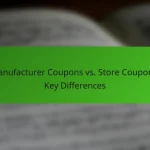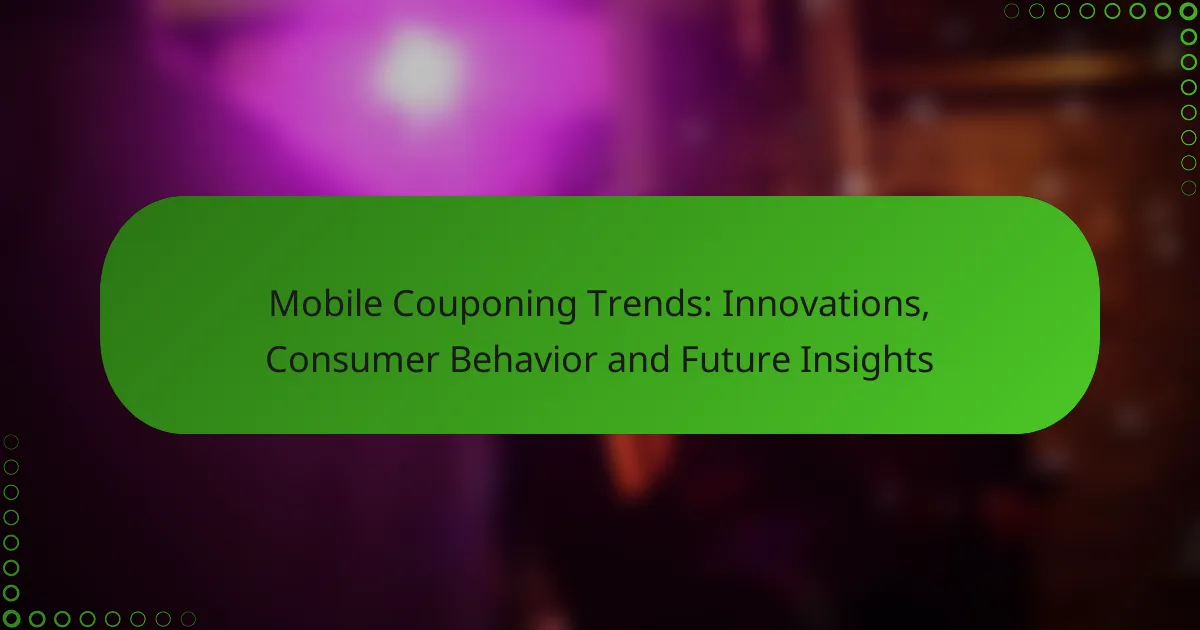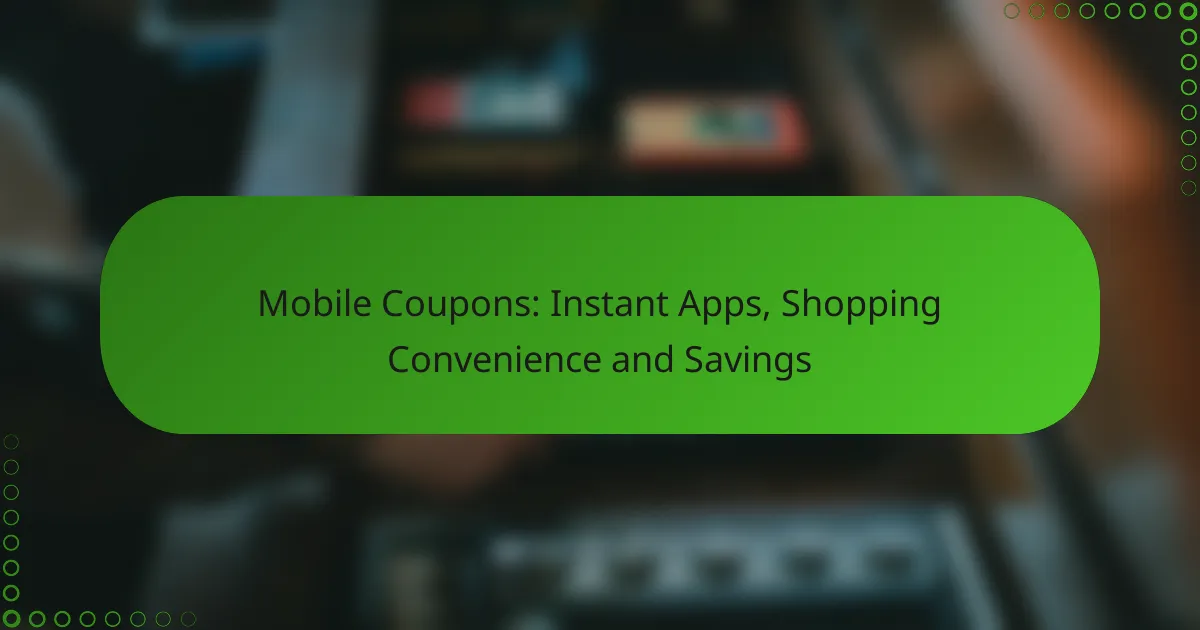The landscape of mobile couponing is rapidly evolving, with a growing emphasis on personalized and location-based offers that cater to consumer preferences. As shoppers increasingly seek convenience and immediacy, businesses are leveraging innovative technologies such as QR codes, NFC, and augmented reality to enhance user engagement and streamline transactions. This shift not only reflects changing consumer behavior but also sets the stage for future advancements in mobile couponing strategies.
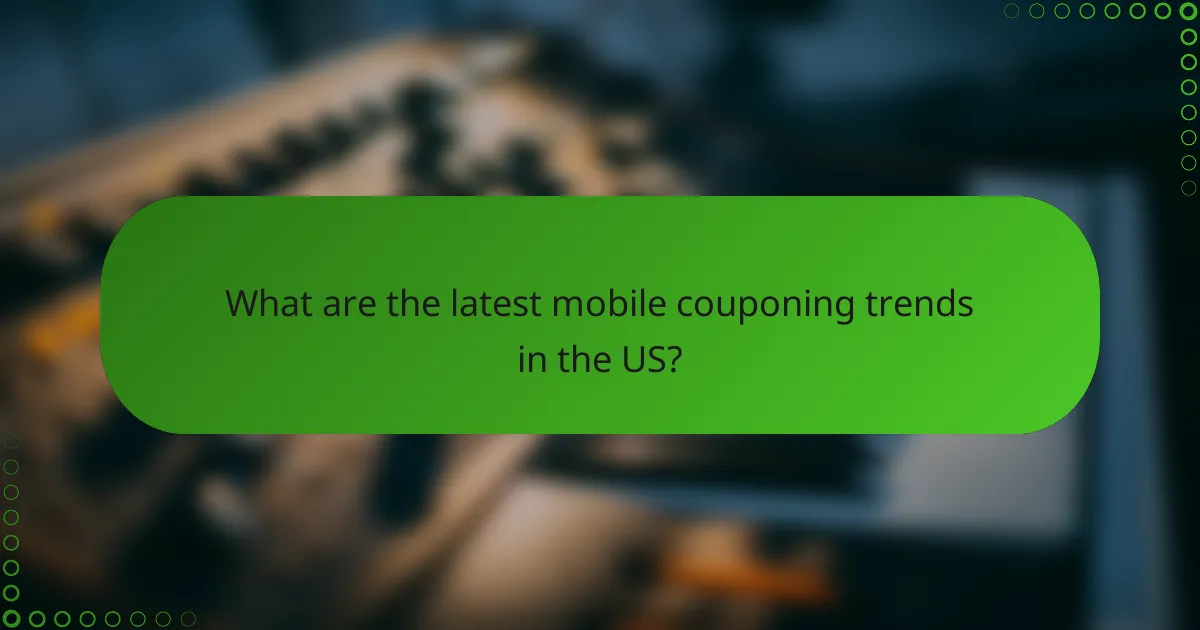
What are the latest mobile couponing trends in the US?
The latest mobile couponing trends in the US highlight a shift towards more personalized, location-based, and integrated solutions. Consumers increasingly expect tailored offers that leverage their location and preferences, driving businesses to adopt innovative technologies.
Increased use of location-based offers
Location-based offers are becoming a key strategy for retailers aiming to engage consumers at the right moment. By utilizing GPS technology, businesses can send targeted coupons to users when they are near a store, increasing the likelihood of immediate purchases.
For example, a coffee shop might send a discount coupon to customers within a few blocks, enticing them to stop in. This approach not only boosts foot traffic but also enhances customer experience by providing relevant offers.
Integration with mobile wallets
Integrating mobile coupons with digital wallets simplifies the redemption process for consumers. Users can store and access their coupons directly within apps like Apple Wallet or Google Pay, making it easier to apply discounts at checkout.
This trend also allows retailers to track coupon usage and consumer behavior more effectively, enabling them to refine their marketing strategies. As mobile wallet adoption grows, businesses that leverage this integration can enhance customer loyalty and streamline transactions.
Personalization through AI
Artificial intelligence is revolutionizing mobile couponing by enabling hyper-personalization. AI algorithms analyze consumer data to predict preferences and behaviors, allowing businesses to tailor offers based on individual shopping habits.
For instance, a retailer might use AI to send personalized coupons for products a customer frequently purchases. This level of customization not only increases engagement but also drives sales, as consumers are more likely to respond to offers that resonate with their interests.
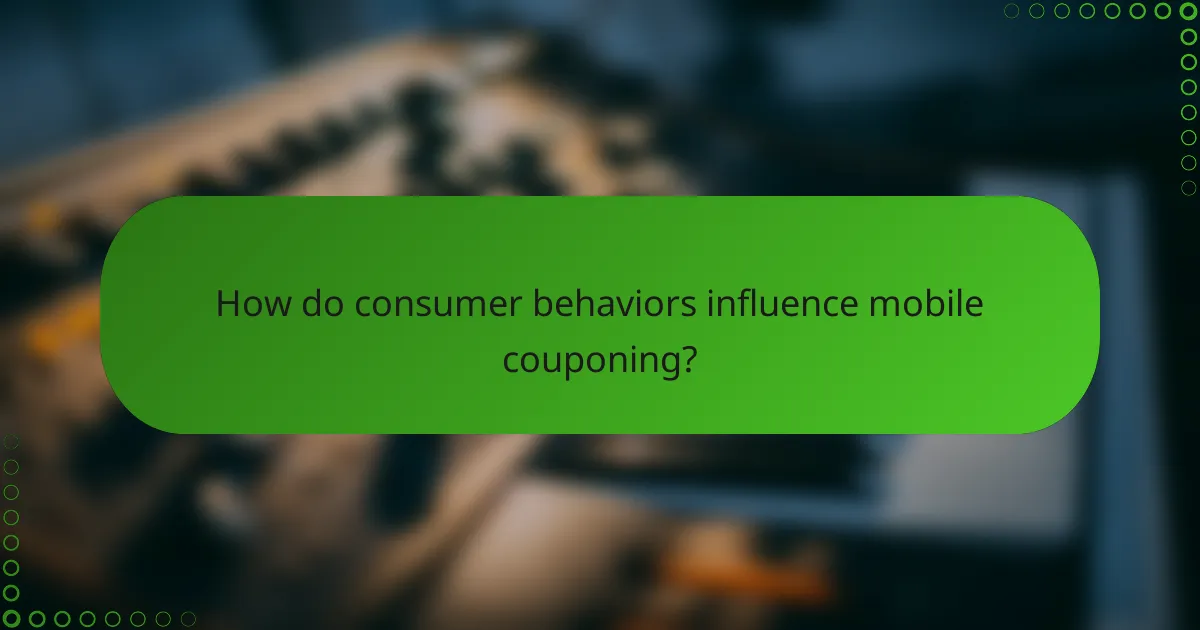
How do consumer behaviors influence mobile couponing?
Consumer behaviors significantly shape mobile couponing by determining how, when, and why individuals engage with digital offers. As preferences shift towards convenience and immediacy, businesses must adapt their strategies to meet these evolving demands.
Preference for digital over paper coupons
Many consumers now prefer digital coupons due to their accessibility and ease of use. Mobile coupons can be stored on smartphones, eliminating the need to carry physical paper, which can easily be lost or forgotten.
Additionally, digital coupons often offer more personalized deals based on shopping habits, making them more appealing. Retailers can track usage patterns and adjust offers in real time, enhancing customer satisfaction.
Impact of social media on coupon sharing
Social media platforms play a crucial role in the sharing and discovery of mobile coupons. Consumers often share their coupon finds with friends and followers, creating a viral effect that can lead to increased brand visibility and customer acquisition.
Brands can leverage this behavior by encouraging users to share coupons on their social media accounts, often incentivizing them with additional discounts or rewards. This strategy not only boosts engagement but also fosters a sense of community around the brand.
Increased engagement through gamification
Gamification in mobile couponing enhances consumer engagement by incorporating game-like elements into the shopping experience. Features such as rewards for completing challenges or earning points for sharing coupons can motivate users to interact more frequently with the app.
For example, a retailer might offer bonus points for using a coupon within a specific time frame or for sharing it with friends. This approach not only drives sales but also builds loyalty as consumers feel more invested in the brand’s offerings.
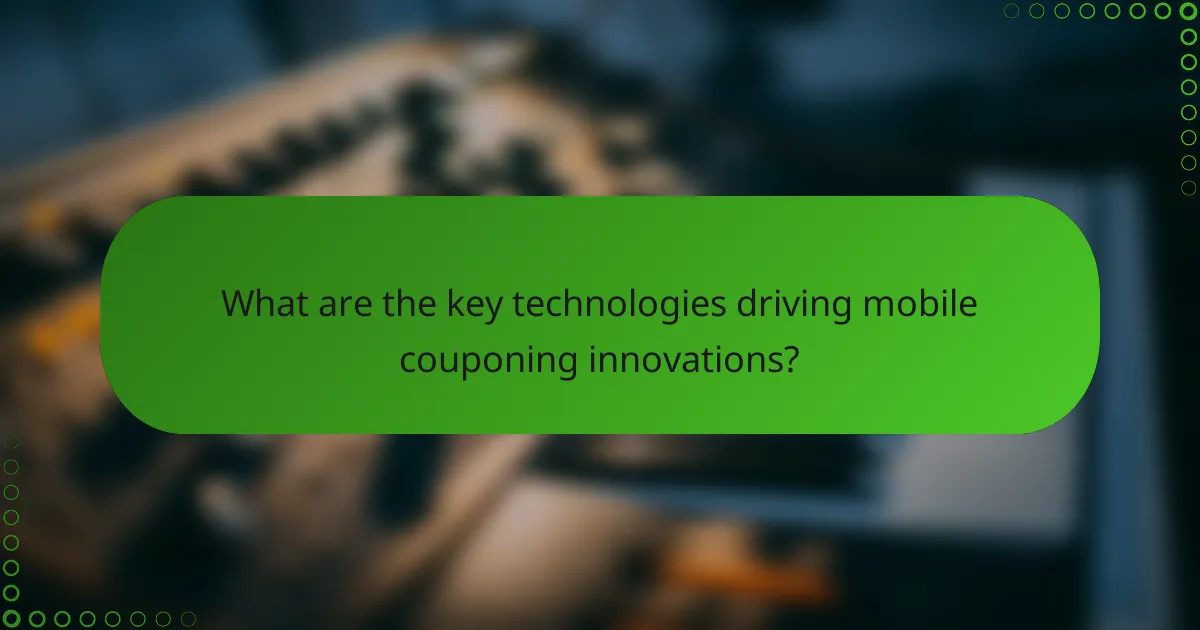
What are the key technologies driving mobile couponing innovations?
Key technologies driving mobile couponing innovations include QR codes, NFC technology, augmented reality, and blockchain. These advancements enhance user engagement, streamline transactions, and improve security, making mobile couponing more effective for both consumers and businesses.
QR codes and NFC technology
QR codes and Near Field Communication (NFC) technology are pivotal in mobile couponing, allowing users to quickly access discounts with a simple scan or tap. QR codes can be printed on physical materials or displayed digitally, while NFC requires close proximity, enabling seamless interactions at point-of-sale terminals.
Businesses can easily generate QR codes for promotions, which can be shared via social media or email. NFC technology, on the other hand, often requires compatible devices, but it offers a faster and more secure transaction method, reducing the time spent at checkout.
Augmented reality experiences
Augmented reality (AR) enhances mobile couponing by creating immersive experiences that engage consumers. Through AR apps, users can visualize products in their environment or unlock exclusive offers by interacting with their surroundings, making the shopping experience more interactive.
For example, a retailer might use AR to allow customers to see how a piece of furniture would look in their home before purchasing. This technology not only drives sales but also increases customer satisfaction by providing a unique and personalized shopping experience.
Blockchain for secure transactions
Blockchain technology is emerging as a solution for secure transactions in mobile couponing. By providing a decentralized ledger, blockchain ensures that coupon transactions are transparent and tamper-proof, which builds trust among consumers and businesses alike.
Using blockchain, companies can track coupon issuance and redemption in real-time, reducing fraud and errors. This technology also allows for the creation of smart contracts, which can automate the coupon redemption process, ensuring that terms are met before discounts are applied.

What factors should businesses consider when implementing mobile coupon strategies?
Businesses should focus on understanding their target audience, ensuring compliance with privacy regulations, and leveraging technology effectively when implementing mobile coupon strategies. These factors can significantly influence the success of their campaigns and customer engagement.
Target audience segmentation
Effective target audience segmentation is crucial for mobile coupon strategies. Businesses should analyze customer demographics, preferences, and behaviors to tailor their offers. For instance, younger consumers may respond better to digital coupons delivered via social media, while older demographics might prefer email notifications.
Utilizing data analytics tools can help identify distinct segments within the customer base. By creating personalized offers, businesses can increase redemption rates and enhance customer loyalty. For example, a coffee shop might send a special discount to frequent morning visitors, encouraging repeat visits.
Compliance with privacy regulations
Compliance with privacy regulations is essential when implementing mobile coupon strategies. Businesses must adhere to laws such as the General Data Protection Regulation (GDPR) in Europe or the California Consumer Privacy Act (CCPA) in the United States. These regulations dictate how customer data can be collected, stored, and used.
To ensure compliance, companies should obtain explicit consent from users before sending coupons and provide clear options for opting out. Regularly reviewing privacy policies and training staff on data protection practices can help mitigate risks associated with non-compliance. Additionally, transparency about data usage can build trust with customers, enhancing their willingness to engage with mobile coupon offers.
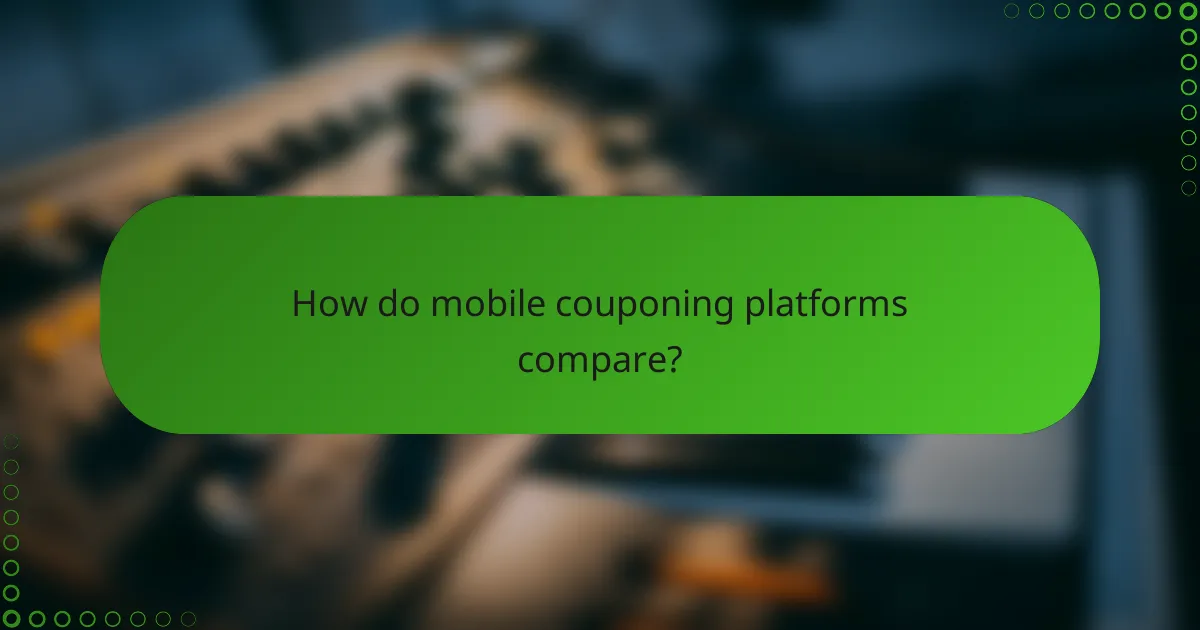
How do mobile couponing platforms compare?
Mobile couponing platforms vary significantly in their offerings, user experience, and redemption processes. Understanding these differences can help consumers choose the best option for their shopping needs.
Groupon vs. RetailMeNot
Groupon primarily focuses on local deals and experiences, offering discounts on services like dining, travel, and activities. Users purchase vouchers upfront, which they can redeem at participating businesses, often leading to significant savings.
In contrast, RetailMeNot serves as a comprehensive coupon aggregator, providing users with access to a wide range of online and in-store coupons without the need for upfront purchases. This platform allows for easy browsing and immediate savings at various retailers, making it a more flexible option for everyday shopping.
Honey vs. Rakuten
Honey operates as a browser extension that automatically applies coupon codes at checkout for online purchases, saving users time and effort. It also offers a rewards program where users can earn points redeemable for gift cards, enhancing the shopping experience.
Rakuten, formerly known as Ebates, focuses on cashback rewards for online shopping. Users earn a percentage of their purchase back when shopping through the Rakuten portal, which can be a lucrative option for frequent online shoppers. The platform often features double cashback offers, incentivizing users to shop through their links.
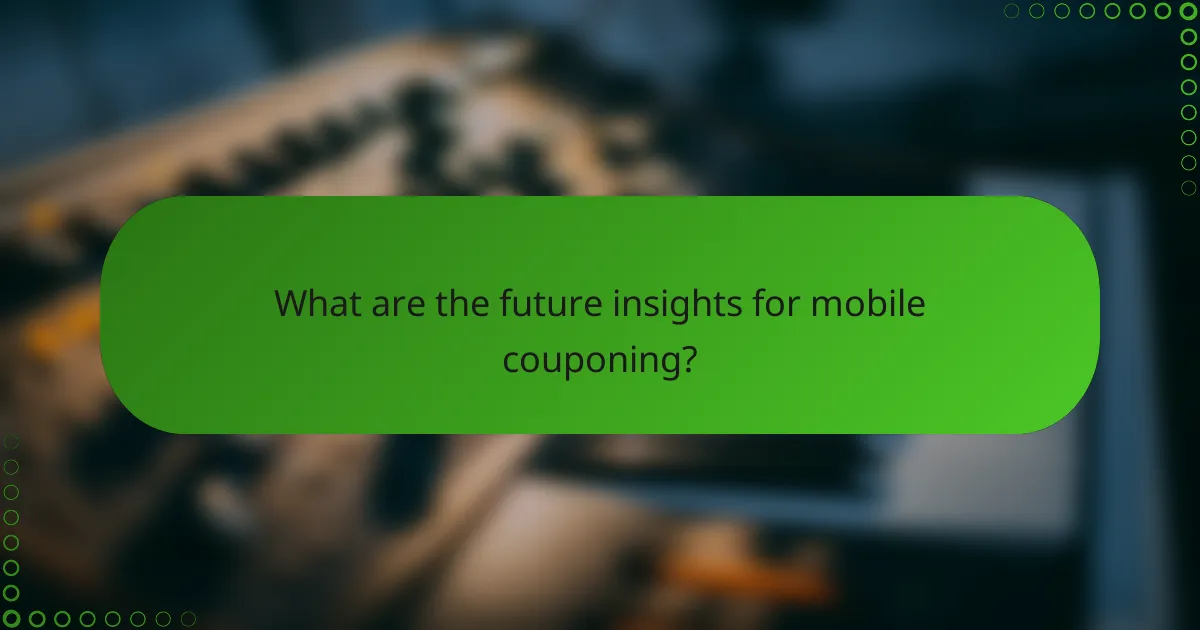
What are the future insights for mobile couponing?
The future of mobile couponing is shaped by technological advancements and evolving consumer preferences. Innovations such as personalized offers, integration with digital wallets, and enhanced analytics are expected to drive engagement and effectiveness in this space.
Innovations in mobile couponing
Innovations in mobile couponing include the use of artificial intelligence to tailor offers based on consumer behavior and preferences. Brands are increasingly utilizing geolocation technology to send targeted coupons when customers are near their stores, enhancing the likelihood of conversion.
Additionally, augmented reality (AR) is emerging as a tool to create interactive coupon experiences, allowing consumers to visualize products in their environment before making a purchase. These innovations not only improve user engagement but also provide valuable data for marketers.
Consumer behavior trends
Consumer behavior in mobile couponing is shifting towards a preference for convenience and personalization. Many shoppers now expect tailored offers that reflect their shopping habits, leading to higher redemption rates when coupons are relevant and timely.
Moreover, the rise of mobile payments has made it easier for consumers to use coupons at checkout, as they can apply discounts directly through their digital wallets. This seamless integration is driving more frequent use of mobile coupons among tech-savvy consumers.
Future insights and predictions
Looking ahead, mobile couponing is likely to become even more integrated with social media platforms, allowing brands to leverage social influence for promotions. As consumers increasingly engage with brands online, the ability to share and redeem coupons through social channels will enhance brand loyalty.
Furthermore, privacy regulations may shape how companies collect and use consumer data for targeted marketing. Brands will need to balance personalization with compliance to maintain consumer trust while maximizing the effectiveness of their mobile couponing strategies.


